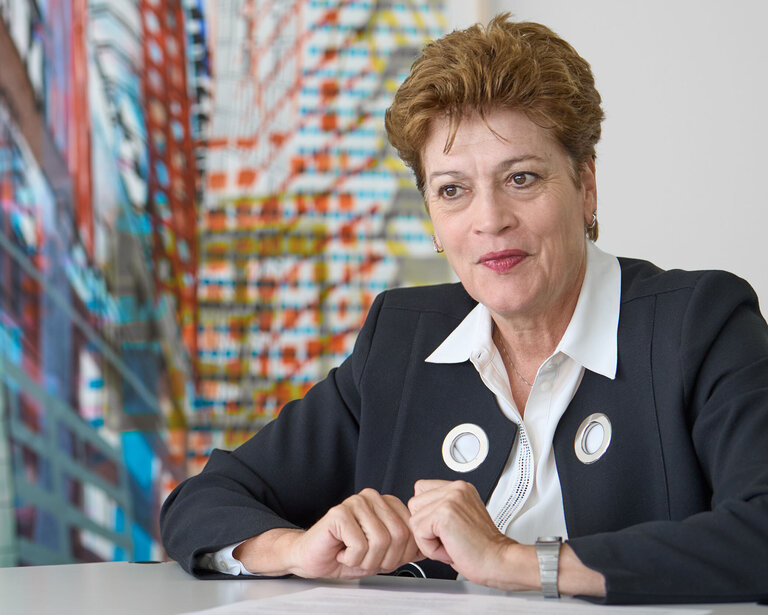
A conversation with the President of the Board of the University and the President of UZH
Director of Education Silvia Steiner and UZH President Michael Schaepman share their thoughts on generative artificial intelligence’s impact on education, international cooperation in the research community, freedom of speech and the relocation of upper secondary schools to Irchel Campus.
Silvia Steiner: This was a project that I loved from the beginning. UZH has shown itself to be a very gracious host. I’m impressed with how the university and the high schools are preparing to share the space on campus. We’ve already started a project group that’s brainstorming about how the shared campus experience can be fruitful for both parties. You get the sense that both sides are willing to accommodate each other, try out new things and get the best results for everyone.
Michael Schaepman: I remember exploring the campus as a young boy scout, back when there were hardly any buildings there at all. Now it’s one of the most attractive and lively campuses in Switzerland, and soon high school students will be injecting even more life into the area. Many of them will also get bitten by the science bug. For Switzerland, it will be a one-of-a-kind combination of high school and university education. We look forward to having an open and diverse campus that offers space for shared learning, teaching, research and experimentation, giving everyone fresh inspiration in the process.

Michael Schaepman (58) completed his undergraduate and doctoral studies at UZH. After stints as a researcher in the Netherlands and the US, he returned to his alma mater as professor of remote sensing in 2009. He was appointed Vice Dean and then Dean of the Faculty of Science in 2014 and 2016, respectively. As a member of the Executive Board of the University from 2017 to 2020, Schaepman was responsible for research, innovation and academic career development. He has been President of UZH since 2020.
Steiner: In my view, the big added value of this solution is also that it stimulates dialogue. It’s important for both levels of education to identify and understand the issues and perspectives of the other side. The HSGYM project has been ensuring that this dialogue takes place for 17 years now, and the planned relocation of schools to Irchel Campus means that the conversation is about to get even more intense. Both the schools and the university will have shared experiences that our entire educational system can benefit from over the long term.
Schaepman: It used to be the case that lexical knowledge was almost exclusively documented in and transmitted by books. Today this information is available online in a wide range of quality and accessible around the clock. Generative AI can support us in developing and synthesizing this know
Steiner: I think that we’ve created the right prerequisites for success by introducing skills-oriented curricula over the past few decades. High school students should learn less by heart but be able to understand the bigger picture and independently find solutions to challenges. Then they’ll be well prepared for the demands that will be imposed on them by digital society.
Steiner: Learning doesn’t mean that your teacher will know everything. The classroom experience also entails learning from one another. This includes not only the young learning from the old, but also the other way around. Digitalization is an opportunity to build bridges between generations. People have different strengths. Some teachers are digital wizards, while others have different qualities that are just as important. They complement one another and can learn from one another as well.
Steiner: A few decades ago, people had similar questions when pocket calculators were introduced. Schools will need to clarify in which situations generative AI can or cannot be used. I think that schools, particularly on the higher levels, need to start trying out how artificial intelligence can be used in an appropriate and responsible manner. This can also be used for performance assessments if there’s a possibility to check whether learners have understood and internalized the content. Of course, the more that AI is permitted, the harder it will be to assess the individual performance of students.
Schaepman: It would be a mistake to hang on to traditional testing models and performance metrics in the age of AI. The only thing we’d be worrying about is how to prevent or uncover cheating. The much more important question, however, is how we can encourage and reward creativity. This means that we should develop new models of examination that allow students to prove their cognitive capabilities, even in assignments that involve the use of AI.
Steiner: Currently there’s a lack of clear regulation when it comes to data protection and privacy. Policymakers, educators and scientists need to work on this together. Here the universities have an important role to play, by supporting the discussions with their expertise. But it would be a mistake to believe that regulations alone will be enough to find our footing with AI.
Schaepman: I agree! We should be promoting the skilled use of generative AI. This is more important and effective than regulations. You underestimate the speed and momentum of technological development if you think you can fence it in just by passing sweeping legislation. There’s also the risk of premature regulation putting the brakes on desirable innovation.
Schaepman: This means, for instance, that we as individuals need to learn how to deal with generative AI in a mature way. To do so, we have to understand how it works. The bigger the data sets that are fed into AI, the more the informational value of the data decreases, which in turn leads to bigger risks of flattened or skewed results. Prejudices and patterns of thought or speech that are already widespread in society will become even more dominant because they are boosted by AI – at least that’s how it is currently. We each have an individual responsibility to recognize and balance out this effect when we use generative AI. How well we manage to do so depends on our ability to reflect, our sensitivity and our education.
One of the jobs of the scientific community is to make artificial intelligence more “clever”, cognitively speaking, and to develop solutions for using it in different fields like law or medicine. Over the past several years, UZH has built up significant research and teaching capacity at this interface between digital technology and society. In 2023 alone we established eight new professorships as part of the Digital Society Initiative (DSI) and the Digitalization Initiative of the Zurich Higher Education Institutions (DIZH). More than 30 have been established since 2016. These are additional investments in our digital future made on top of the normal institutional development of the university.
Steiner: Digital transformation is a classic interdisciplinary issue. Since everyone is affected, it makes a lot of sense to work together. The DIZH, which was launched in 2020, led to the participating institutions – UZH, ZHAW, ZHdK and PHZH – working much more closely with one another than ever before. The issues range from cybersecurity to health to digital crisis management. DIZH also promotes innovative teaching solutions. We need to strengthen this cooperation further.
Schaepman: The 11 universities that make up the Una Europa network provide mutual support on a variety of development issues, for instance research funding and efforts to internationalize teaching. UZH is an attractive and internationally well-networked partner institution: alongside Una Europa, UZH is part of several strategic partnerships and other international networks such as LERU and U21. The global network of our research community is much broader, however, than any institutional cooperation ever could be. Academia is a global framework with researchers interacting with each other in a wide variety of ways. New knowledge arises when working – and competing – together across borders.
Schaepman: The European research community offers us the best conditions for scholarly competition, so for that reason we at UZH would find it extremely welcome for Switzerland to be able to participate in Horizon Europe and its associated programs. And in parallel, we should also be aiming for more research partnerships with countries from the Global South. We have a lot to learn from researchers who have a different worldview, who ask different questions and who are familiar with other solutions and have other priorities.
Steiner: These actually fit very well together! Our universities have local roots while making an impact far beyond Switzerland. This combination is our recipe for success. A lot of companies come here precisely for this reason: here they can find a stable but internationally oriented environment, including universities with global reach. UZH alone decides which international partnerships and cooperations it enters into. I always try to open doors whenever I can. For instance, I recently signed a memorandum of understanding on scientific cooperation between the canton of Zurich and the German state of Baden-Württemberg. Conversely, policymakers and the canton itself both benefit from the presence of the universities. Here I’m reminded of our experience during the Covid pandemic, where we were able to answer completely new types of questions thanks to our close cooperation with scientists.
Steiner: Freedom to express one’s opinion and to engage in open dialogue are critical in a democratic society. This openness would be worth very little without the ability and willingness to listen to one another and to deal with and understand different interests and perspectives. Here the university has an important and very demanding role to play, by placing these different positions in an objective framework and making it possible to reflect on social reality. This is of major importance for democracy.
Schaepman: Open dialogue at UZH is based on our values and ethical principles. This requires an atmosphere of respect and mutual appreciation that we must nurture. Calls to violence, for example, are not tolerated, which is why we banned a demonstration in the fall of 2023 that would have spread hateful slogans.
However, in order to create a good environment for vibrant dialogue, you have to not only accept dissent but have a positive attitude towards it. The 1967 report of the Kalven Committee at the University of Chicago, which is widely cited today, stipulates that viewpoint diversity, intellectual freedom, criticism and dissent are indispensable to the production of knowledge. The report also emphasizes that good universities are spaces where certainties can be shattered, where dissatisfaction with the prevailing order can be articulated, and where new solutions can be proposed. It’s in the interest of society for universities to provide space for unpleasant voices that challenge the consensus. At the same time, it’s important for universities not to get pulled to one political side or the other, but rather to remain neutral as an institution. UZH is mainly financed from the public purse. This is a great advantage as well as a critical requirement for maintaining institutional neutrality and offering an appropriate platform for coexistence between a variety of voices.